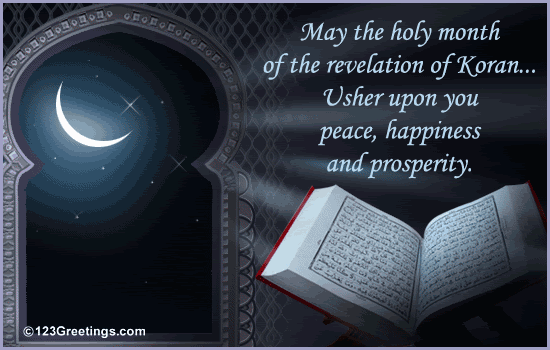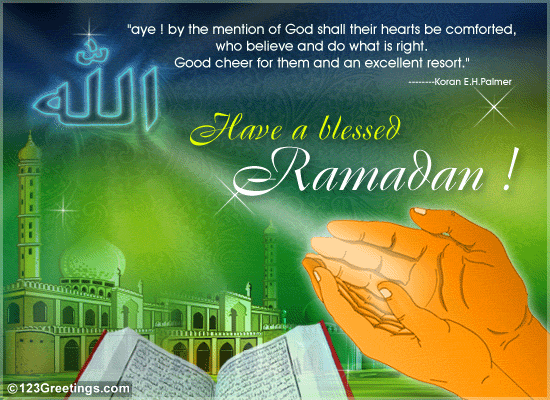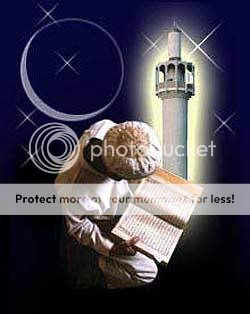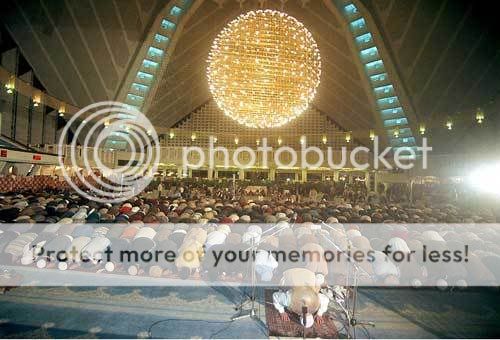
Practices during Ramadan
Fasting
The most prominent event of this month is the fasting practiced by most observant Muslims. The fasting during Ramadan has been so predominant in defining the month that some have been led to believe the name of this month, Ramadan, is the name of Islamic fasting, when in reality the Arabic term for fasting is Sawm. Every day during the month of Ramadan, Muslims around the world break their fast when the fourth prayer of the day, Maghrib (sunset), is due. They eat before the sun comes up at a certain time and after a certain time during the night.
-
Proscriptions and prescriptions during Ramadan
Sultan Ahmet Mosque, Istanbul in Ramadan (the writing with lights called mahya)
During Ramadan, Muslims are also expected to put more effort into following the teachings of Islam as well as refraining from anger, envy, greed, lust, sarcastic retorts, backbiting, and gossip. They are encouraged to read the Qur'an. Sexual intercourse during fasting in the day is not allowed but is permissible after the fast (when referring to sexual intercourse, it is intended to mean with one's spouse alone, as all pre- and extra-marital relations are strictly forbidden in Islam). Obscene and irreligious sights and sounds are to be avoided. Purity of both thought and action is important.
The fast is intended to be an exacting act of deep personal worship in which Muslims seek a raised level of closeness to God. The act of fasting is said to redirect the heart away from worldly activities, its purpose being to cleanse the inner soul and free it from harm. Properly observing the fast is supposed to induce a comfortable feeling of peace and calm. It also allows Muslims to practice self-discipline, sacrifice, as well as sympathy for those who are less fortunate, intending to make Muslims more generous and charitable.

In addition to fasting, Muslims are encouraged to read the entire Qur'an.

The three parts of the month of Ramadan
These parts are called ashra (Arabic for ten) which means of ten days or about one third of the month.These are named respectively as
Rahmat: which means mercy of God.
Maghfirat: which means forgiveness of God.
Nijat which means salvation or going to heaven.

Laylat Al-Qadr
Laylat al-Qadr (Arabic: ???? ?????) (also known as Shab-e-Qadr), literally the Night of Decree or Night of Measures, is the anniversary of two very important dates in Islam that occurred in the month of Ramadan.
-
Eid ul-Fitr
The Islamicholiday of Eid ul-Fitr (Arabic: ??? ?????) marks the end of the fasting period of Ramadan and the first day of the following month, after another new moon has been sighted. Eid ul-Fitr means the Festival of Breaking the Fast, a special celebration is made. Food is donated to the poor ('Zakat al-Fitr'), everyone put on their best, preferably new, clothes, and communal prayers are held in the early morning, followed by feasting and visiting relatives and friends. The prayer is two rakaahs only, and it is an optional prayer as opposed to the compulsory 5 daily prayers.
-
Six days of Shawwal
-
Muslims are encouraged to fast six days in 'Shawwal', the month following Ramadan beginning after Eid ul-Fitr. There are six days of fasting during Shawwal which, together with the Ramadan fasts, are equivalent to fasting "perpetually" . Usually, this is taken to mean the whole year. It is a common misconception that the six days of fasting must be undertaken on consecutive days. It is said that fasting six days of Shawwal is like fasting for one full year.

Edited by maha_prakrti - 18 years ago










































